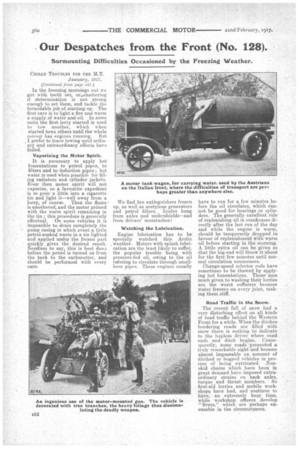. Our Despatches from the Front (No. 128).
Page 18

If you've noticed an error in this article please click here to report it so we can fix it.
Surmounting Difficulties Occasioned by the Freezing Weather.
CHILLY TROUBLES FOR THE M.T.
January, 1917. (Continued from page &Si.) In the freezing mornings out we get with teeth set, or,chattering if determination is not strong enough to set them, and tackle the formidable job of starting-up. The first care is to light a fire and warm a supPly, of water and oil. In some units the first lorry started is used to tow another, which when started tows others until the whole convoy has engines running. But I prefer to leave towing until 'ordinary and extraordinary efforts have Vaporizing the Motor Spirit.
It is necessary to apply hot fomentations to petrol pipes, to filters and to induction pipes; hot water is used when possible for tilling radiators and cylinder jackets. Even then motor spirit will not vaporize, so a favourite expedient is to .pour a little into a cigarette tin and light it—well away from a lorry, of course. Then the flame is smothered, and the motor primed with the warm spirit remaining in the tin ; this procedure is generally effectual. On some vehicles it is impossible to drain completely the pump easing in which event a little petrol-soaked waste in a tin lighted and applied under the frozen part quickly gives the desired result. Needless to say, this is best dona before the petrol is turned on from the tank to the carburetter, and should be performed with every care. We find fire extinguishers frozen up, as well as acetylene generators and petrol filters. Icicles hang from axles and undershields—and from drivers' moustaches!
Watching the Lubrication.
Engine lubrication has to be specially watched this Arctic weather. Motors with splash lubrication are the least likely to suffer, the popular trouble -being with pressure-fed oil, owing to the oil refusing to circulate through smallbore pipes. These engines usually have to run for a few minutes before the oil circulates, which cannot be good for bearings or cylinders. The generally excellent rule of replenishing oil in crankcases directly alter the last run of the day and while the engine is warm, should be 'temporarily dropped in favour of replenishment with warm oil before starting in the morning. A little extra oil can be given so that the big-end will throw it about for the first few minutes until normal circulation commences.
Change-speed selector rods have sometimes to be thawed by applying hot fornentations. Those men much given to washing their lorries are the worst sufferers because water freezes on every joint, making them stiff.
Road Traffic in the Snow.
The recent fall of snow had a very disturbing effect on all kinds of road traffic behind the Western Front for a, while. When the ditches bordering roads are filled with snow there is nothing to indicate to the hapless driver where road ends and ditch begins. Consequently, some roads presented a truly remarkable sight and became almost impassable on account of ditched or bogged vehicles in process of being extricated. Nonskid chains which have been in great demand have imposed extraordinary strains on back axles, torque and thrust members. So first-aid lorries and mobile workshops have had, and continue to have, an extremely busy time, while workshop officers develop "livers," which are perhaps excusable in the circumstances.
























